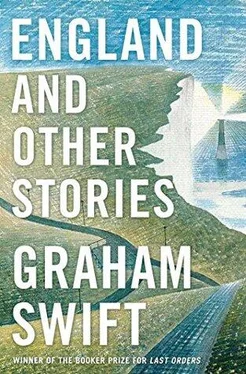Yes, he remembered now. It popped up from some submerged place as if it had only been waiting for this moment. The very first had been little Howard Clarke. Now he remembered even the name — and remembered the other thing too. Howard Clarke had been the wicket keeper, his small hands encased in monstrous gloves, the wicket keeper whose skill had not been needed when he’d made that legendary throw. The wicket keeper who’d raised his exultant arms.
The point being that Howard Clarke, aged ten yet already marked out as a wicket keeper, had gone off as they all had for the summer holiday, but had never returned. It had been somehow conveyed to them, early in September, that he was never going to return. A brain tumour, someone said, whatever that was. A brain tumour, perhaps as dense and undeniable as a cricket ball, inside his head.
Grant continued to speak, but he didn’t listen or couldn’t focus. It was enough — surely enough since it was everything — to have to take in the main thing. He’d already asked the question that he’d never thought he’d hear himself ask, the question people only asked in films. And Grant had answered, though through a sort of fog. Had he said six months or eighteen, or that it could be anywhere between the two? Grant was now speaking of what might be done to ‘maximise his quality of life’ (had he heard that phrase?). But he wasn’t really listening. Oddly, given the crucial nature of it all, he wasn’t concentrating.
Again, he knew this sort of thing from the other side. How many times, after telling clients some urgent sobering fact, had he watched their faces glaze over as he went on to explain the repercussions? They were still digesting the main thing. But what could you do except carry on? It was your professional obligation.
But mainly he couldn’t concentrate on Grant because of the way Grant was crowded out, in his small room, by these others, by these ranks of dead ones, or of living memories, going back as far as Howard Clarke. They were far more important than Grant. Grant was being replaced by them — he’d even for a moment turned into Anne — so that his voice seemed to become increasingly feeble. It even seemed — but was this another confusion with Anne? — that Grant was the floundering and struggling one, the one in difficulties, and he felt a great gush of pity, mixed with something like wise seniority, for this man placed in the awful position of having to make the announcement he’d just made.
Grant, he supposed, when he wasn’t being a physician, was a family man with a wife, and children perhaps now in their teens. He would go back to all that this evening. Which meant that he belonged, unquestionably, to the freely living, to those whose lives were not closed and finite. Whereas he, now, was of the other sort, the minority. He was not now of the same kind as Grant, though he had been moments ago, before entering his consulting room.
Yet he’d always been — or had been for the last ten years and those ten years had become a sort of ‘always’—a man of a different kind of minority. Of a kind who’d sometimes say, by way of giving a general, guarded account of himself, ‘I live alone.’
Had he said it at some point to Grant?
It had become his watchword. He said it to clients, particularly clients he was guiding through the troublesome process of divorce, and he could say it with a judicious ironical tone, even a crinkly smile. So they could never tell what he really meant. An expression of sad fact? Or of proud resolution? An explanation, or a recommendation?
Grant, he thought, was speaking, in his flailing voice, with the strange loquacity of the living, with the gabble with which one might speak about all the detailed necessary arrangements for a wedding while somehow forgetting the main thing, that two people were about to commit themselves to each other for life.
Except this wasn’t a wedding.
Yet he saw himself clearly for a moment (no longer a small boy on a cricket field) at his own wedding, nearly thirty years ago, and all the other people at it, several of whom were now dead and thus among this muster here in Grant’s room. It had been a thronged lavish wedding because Anne came from a large and wealthy family, while he was just a suburban boy who’d landed on his feet. West Ealing to Winchester. The Sixties song had lodged in his brain. Win-chester Cathedral . . Would they have to get married, he’d joked, in Winchester Cathedral?
How strange to have had such a packed wedding when he was now a man who said, ‘I live alone.’
And he remembered how before the wedding he’d gone with Anne down to the jetty at Lymington with two bottles of champagne clanking in a bag. And they’d rowed out to where the Marinella was anchored. It was theirs now. It had been in Anne’s family for years, but it was officially theirs now, a wedding present, though the sort that can’t be wrapped or hidden. And before they climbed aboard — to drink the second bottle and make ceremonial waterborne love in the cabin — Anne had smashed the first bottle, with a fine flourish of her arm, against the bows, saying, ‘I name this yacht the Marinella , the yacht of our marriage. May God bless all those who navigate and copulate in her.’ He’d never thought he could become (with Anne’s instruction) a sailor. That, with Anne, he could sail the Marinella to Jersey, Guernsey, Brittany, Portugal. He was a provincial lawyer, a decent fish in a smallish pond, whose only act of physical prowess had been that amazing throw at primary school, Howard Clarke’s leathered hands raised high.
‘I live alone.’ Fewer and fewer people now knew, or remembered, why he said this. One of them was Janice, the receptionist, the veteran uncomplaining Janice, right now guarding his office.
Why had Janice, who was not dead, sprung suddenly into his mind?
Because, he realised, she’d almost certainly be the first person, not counting Grant himself (who was still wittering on), he’d have to confront after having received this news.
And then. . and then he’d have to confront Mrs Roberts, whom he’d never met. Mrs Roberts: 5.15. Mrs Roberts who was on the brink of that troublesome process, or precipice, known as divorce.
Why was he thinking of his office — in Grant’s ‘office’? ‘Eliot and Holloway’. He pictured it for a moment like some distant light seen in a dark forest. Why was he thinking of Mrs Roberts whom he’d never met? But he knew now. He knew now why he’d kept his 5.15 appointment, despite Janice’s puzzled and concerned gaze. ‘Why don’t you get me to move it?’ she’d almost said. He’d read her thought: Why, if your appointment’s at four, don’t you just take the afternoon off? A fair question. But he’d insisted. ‘I’ll keep my 5.15.’
‘I live alone.’ Would he say it to Mrs Roberts? And in the same cryptically smiling way as ever?
I live alone. Did that fact, too, save him, come to his rescue now?
Grant was gabbling on, so it seemed, like a man put on the spot. And he was listening to him, hearing him out, like some silent patient judge. It came to him that what Grant was saying might be a fabrication, a ruse. He knew it wasn’t. Little Howard Clarke had proved it. Nonetheless, the idea was somehow to be seized. There also came to him, in this meeting of two professional men bound by rules of confidentiality, the phrase he sometimes used, with a certain solemnity, in his own profession: ‘Nothing need go beyond this room.’
He saw the cubicle of a room he was in like some locked vault in a bank. It was a very important room — it was the room in which he’d learnt the most important fact of his life — but nothing need go beyond it.
Except himself. He saw that it was vital that in a moment he should get up and leave and in passing through the door, crossing the waiting room, signing out at the desk, then exiting through the glass doors be absolutely no different (though he absolutely was) from the man who’d walked in.
Читать дальше












